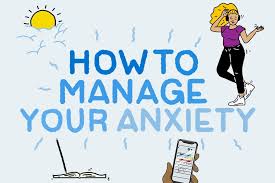Introduction
In today’s fast moving society, plus the prevailing pandemic and all, many people are concerned about various things in life. This can be because of their job, their company, their finances or the health of themselves or a relative. What the majority do not realize is that stress has a major impact on your  ability to see solutions and on your effectiveness to produce results.
ability to see solutions and on your effectiveness to produce results.
Do something about it
Once you are fully aware of the stressful situation, just know that you can do something about it. Here are the things you can do in order to reduce anxiety and stress at the workplace. If you would fear for work and income then I can give you a very popular alternative at the end, see point 10.
The points given below will not only help people with jobs, but will also be applicable for all others with stress symptoms, especially in these uncertain times.
Make it more interesting and at the same time start making money on the side! See my unique opportunity in the last paragraph.
1. Lower your heart rate
There are simple exercises that allow you to calm down quickly. Yoga and mindfulness are proven methods that can help you relieve stress, and thus anxiety. For example, a good exercise is to breathe in for three seconds, then hold your breath for three seconds and then breathe out for three seconds.
At the end you wait a little while before you breathe in again. You can repeat this about ten times. You then will notice that your heart rate has gone down and that reduces stress and anxiety.
about ten times. You then will notice that your heart rate has gone down and that reduces stress and anxiety.
Also you can try to exercise enough every day and find the sunlight, yes also in these times. This promotes the production of the happiness hormone serotonin. That has a calming effect and a beneficial effect on your mood and sleep pattern.
2. Have a focus
Do mindfulness exercises to relax your mind. Focus with extra attention on everything you do and experience what you are doing. For example, on the taste and texture of the food you eat, on the view from your desk or the sound of your boss’s voice, your feet on the floor when you walk or the voice of any person you are talking to. How does that feel? What do you see? What do you hear? Open up all your senses and experience to what is there.
Reading the newspaper during breakfast is not done, as you will only get a little bit of each pleasure.
3. Don’t show your fear
You may feel the fear in your body, for example in the form of tightness in  your chest. Running away from it is almost never effective. Just try to imagine that you breathe in and out despite this nasty feeling. Keep the feeling close to you and don’t try to look the other way.
your chest. Running away from it is almost never effective. Just try to imagine that you breathe in and out despite this nasty feeling. Keep the feeling close to you and don’t try to look the other way.
If you continuously and actively try to suppress a feeling of annoyance, this creates extra tension. If you stop doing that, you can paradoxically often relax. This might be especially helpful in a working atmosphere.
4. Accept your situation
You are not a superman or woman. Accept that good moment with little stress alternate with moments when the walls seem to come down. Experiencing all these different emotions really belongs to an uncertain time like this.
Do not be afraid and be aware that you will always remain in this condition. Trust that after every panic moment there will come a time when things lighten up. Try not to think too far ahead. Live in the now as much as possible. Now you may not have financial stress yet and you can still shop for groceries. And now you have no physical complaints or disease symptoms. You might be worrying about something that will never happen!
5. Put things into perspective
If you want your negative thoughts to have less control over you, you can examine how realistic they are. One way to deal with fear is the RET method (Rational Emotional Therapy). You can use it to determine which fear thoughts are rational and which are not. 
Take a close look at a thought that evokes anxious feelings. Is that thought really correct? This is often not the case: your doomsday scenario cannot be substantiated. Find and repeat a thought that will help you.
Even if it feels artificial to do this at first, if you practice this regularly, it is becoming more and more a habit to speak positively to yourself. You have no influence on certain events, but you do have on your feelings and thoughts. Take advantage of that distinction.
6. Refute your fear
You can also use techniques from positive psychology. This shifts the focus from the negative to the positive. You give 15 percent attention to your fears and problems, but you focus 85 percent on what is going well.
How do you do that? For example, every night you can write down three things for yourself for which you are grateful. Also describe the share you had in it. You may have more contact with your friends and parents than ever, or you may be happy with the security you experience within your family. If you are unable to evoke those feelings, you can go back to an event earlier in life where you did experience intensely positive emotions. Write about this for half an hour. Focusing on the positive side makes those feelings bigger.
It also helps to make extra contact with your loved ones and people who need it more. The happiest people turn out to have intense and meaningful relationships. And helping others also makes people happy. Commit to something outside yourself. Do your part in these difficult times. You can also mean a lot to others from home.
7. See your work as a blessing
Your job and your work can also be a good distraction from fear.
Try to divide your day into blocks. Take a break in time and then try to go  outside for a little walk. Relaxation helps you focus better. Raise the bar slightly. Don’t expect to be able to deliver the same output in these circumstances. Don’t take too much work on your plate. Learn to accept that it is okay if less success is achieved than you had previously planned. Maybe you demanded too much from yourself anyway.
outside for a little walk. Relaxation helps you focus better. Raise the bar slightly. Don’t expect to be able to deliver the same output in these circumstances. Don’t take too much work on your plate. Learn to accept that it is okay if less success is achieved than you had previously planned. Maybe you demanded too much from yourself anyway.
Also look for fun activities outside your work. For example, go gardening on your balcony or extensive cooking every night for yourself or others. You can be very happy about that.
8. Shut down
Make it easier for yourself to unwind.
Don’t read too many newspapers, too many negative stories. Only watch the journal once a day. If possible, get a breath of fresh air every day. In any case, try to do something for yourself for one hour a day, in an area where you can be bothered as little as possible. That can be a study, bedroom or outside. Rising irritations and other stressors only contribute to the development of anxiety. You will find that if you are less stressed, you will also be less troubled by anxious thoughts or feelings.
And if you are alone at home? Then it is good to make regular contact with the outside world. Call someone or use social media for example. Get groceries for someone you know or take an online sports class or yoga class. Having contact with others reduces the feeling of anxiety.
9. Support each other
Everyone is currently in the same boat and experiences more or less the same. Your upstairs neighbor will also be desperate from time to time. The  shopkeeper will occasionally have sleepless nights about whether or not he can keep his business afloat. Offer a listening ear, show understanding.
shopkeeper will occasionally have sleepless nights about whether or not he can keep his business afloat. Offer a listening ear, show understanding.
It is quite normal for people to feel anxious and insecure during this time. I also suffer from that. It can sometimes overtake you, or simmer a little under the skin. And then it is nice if you can support each other as family members or friends. Human contact is known to be a very good brake on anxious thoughts and feelings. Shared grief is often also a bit of half-grief.
10. Take action
If there is a practical solution that can help you ease your concerns, then take action.
Are you afraid that major problems will arise in the future, for example, the loss of your job or income? Then it is smart to make a plan now on how to deal with this. Think actively about your career. In which sectors will there be a lot of  work after the crisis? If necessary, apply for a bridging loan or a benefit from the municipality to get through these difficult months.
work after the crisis? If necessary, apply for a bridging loan or a benefit from the municipality to get through these difficult months.
Why not start making money on the side? Instead of sitting at home worrying, you could be working on your own business and a steady income for yourself! Here is my recommendation number 1:
Recommendation # 1
With perfect outside help, at little cost, you will start your own website or sites. As a member you will have a site within minutes. You take one of your hobbies, start writing about it, draw visitors, advertise products and make money. How is this going? I have all explained it in my full review of the world’s best internet business support program, which review can be accessed by clicking here.
In the review I will give you a link to the program and when used you will have Free access for one full week, during which you can experience this community and its training firsthand. Over two million members have already signed up since 2005. Are you the next?


hello there!
I generally love your site, its really informative and the theme is beautiful.
when I saw the title “how to beat your boss” I was shocked and was curious to know more about the content, the 10 points that you gave which are supposed to help one in their jobs and even those suffering from stress and anxiety can apply them it is really cool and amazing.
Thanks for sharing, great job there
Stephen.
Yes, it is how to beat as in defeat your boss. Anxiety and stress can cause a lot of problems, especially not being aware that you suffer. So I let people know what they can and should do about it.